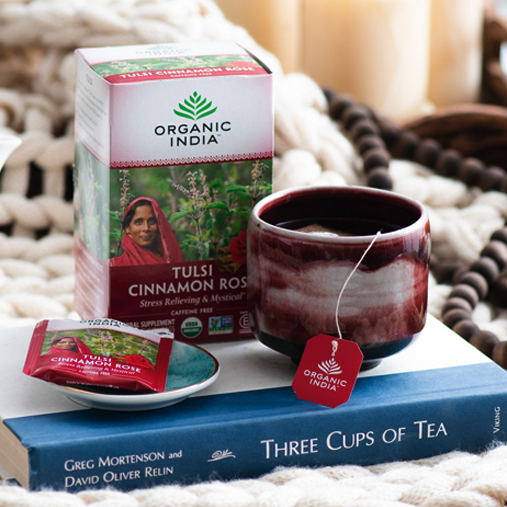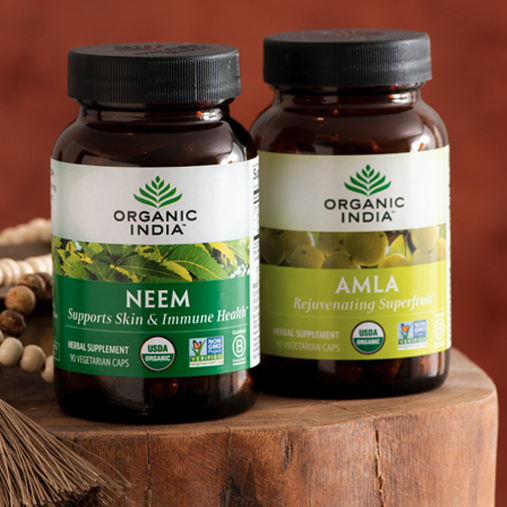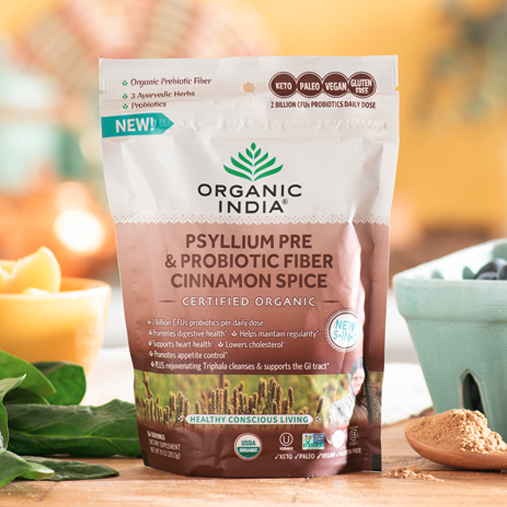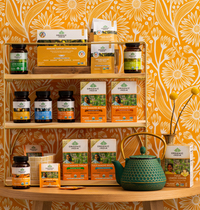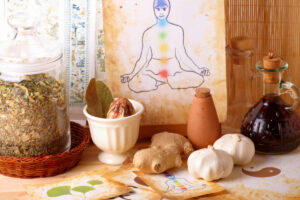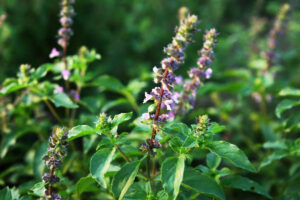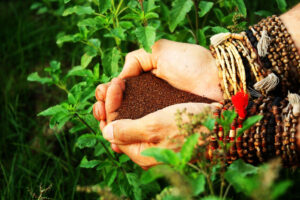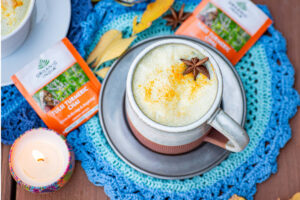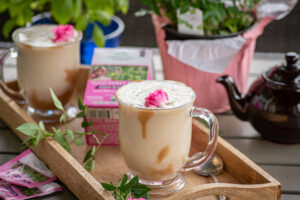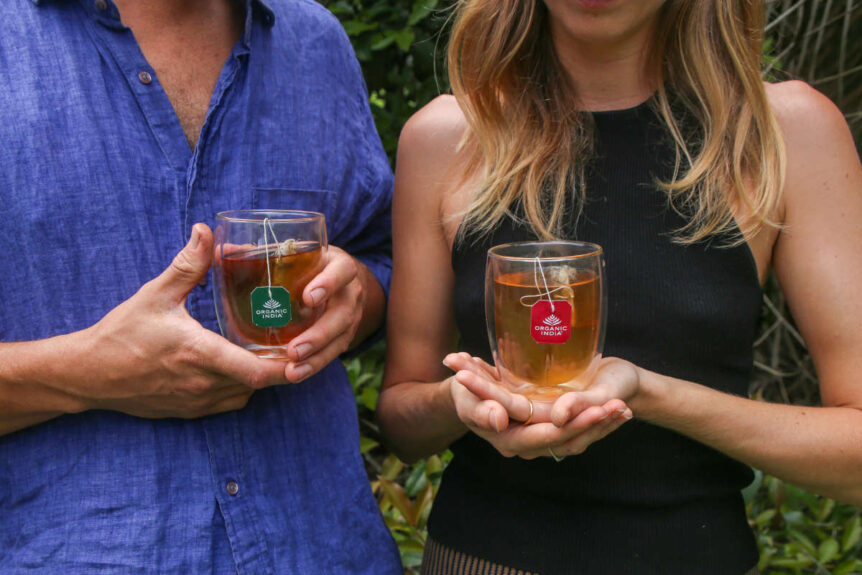Back
Love is said to be the highest and most healing vibration that permeates everything good and true.
No matter what religion, creed, or belief system you ascribe to (even if you do not have a spiritual practice), we can all agree love is the universal language that imparts joy, purpose and meaning.
If you’re looking for ways to bring more love into your life, be it in a romantic sense or even more self-love and compassion, plants can help.
Specific plants have been used throughout cultures since the beginning of time to bring forth and enhance the quality of love, affection, compassion, attachment and desire.
In this article, we’ll share our top nine herbs for love, self-love, and compassion and how to use them to create a happier, warmer, and more satisfying life.
What Herb Is the Symbol of Love?
Rose is likely the first you’ll hear among the top herbs for love, including on our list here. However, many herbs, plants, foods, and flowers are considered symbols of love, passion, and desire in various cultures, including:
- Rose, specifically red roses
- Basil
- Cinnamon
- Cacao (chocolate)
- Fennel
- Ginger
- Horny Goat Weed
- Damiana
- Jasmine
- Saffron
- Maca
- Hawthorne
- Lavender
- Mugwort
- Bay leaves
- Shatavari
- Ashwagandha
- Asparagus
- Pomegranates
- Apples
- Vanilla
- Tulsi
- Chamomile
- Thyme
- Patchouli
- Ylang ylang
- Yarrow
Some of these herbs are traditionally used as aphrodisiacs. In contrast, others are used to balance the heart chakra and/or bring about harmony, self-love, compassion, attraction, love energy, and forgiveness.
We’ll explore more about several of these herbs coming up.
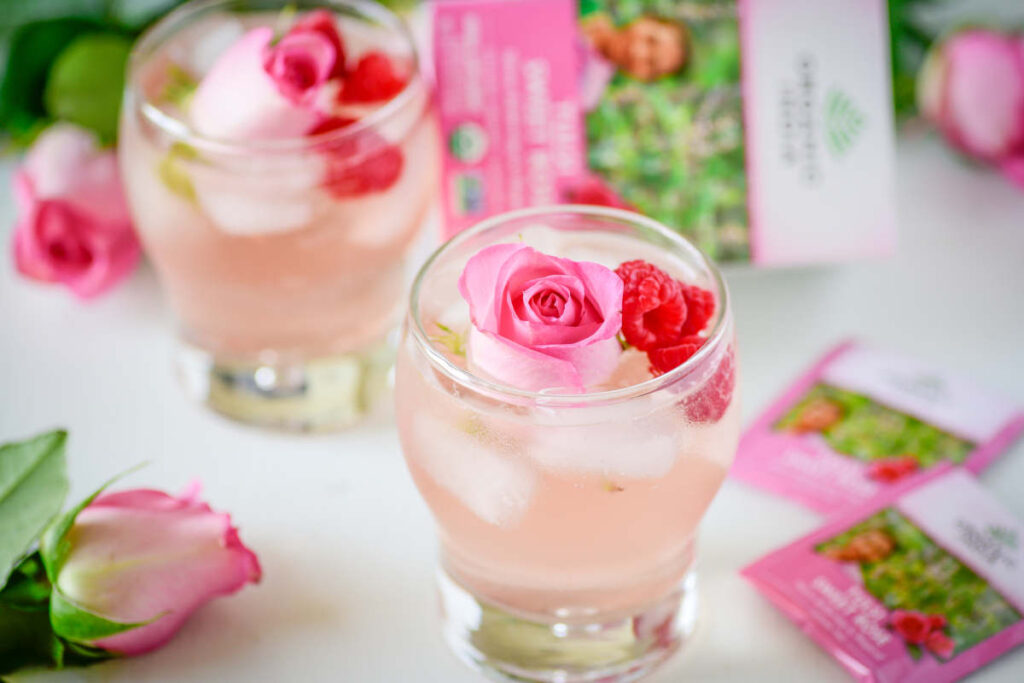
Top 9 Herbs for Love
Although we’d love to examine the historical uses and science behind all the herbs, plants, and foods for love mentioned previously, that would take several articles.
Instead, we offer this list of the top nine herbs for love with a recipe for Love Potion to follow!
1. Rose
There are few plants more associated with love than Roses.
As discussed in 7 Beautiful Benefits of Rose Tea: “King of Flowers” Rose is a powerful herb for stress support, relaxation, digestive comfort, spiritual support, and love.
In Ayurveda, Rose is revered for its soothing and calming effects on the heart. It is also “tridoshic,” meaning it pacifies and supports all the Doshas (Vatta, Pitta, and Kapha), and is considered a symbol of love.
Research has shown Rose may impart a slightly hypnotic and calming effect, which may explain its use in spiritual practices and romance.
Roses can be used for love in many ways, including:
- In teas, like Organic India’s Tulsi Sweet Rose Assam Black or Tulsi Cinnamon Rose, and other beverages, like this Pink Potion Latte With Beet And Rose or Rose Tea Latte With Easy Date Caramel Drizzle
- Diffused as essential oils to set a romantic mood, reduce stress, or enhance meditation
- Organic Rose petals can be crushed in various culinary recipes, like baked goods
- In personal care products such as bath salts, scrubs, massage oils, and more
2. Ceylon Cinnamon
Ceylon Cinnamon, also known as “true cinnamon,” is considered the highest-quality cinnamon due to its superior flavor, origins, and antioxidant properties.
This spice was once so revered that it was more valuable than gold and wars were fought over its trade.
It’s also a well-known and cherished symbol of love, a possible aphrodisiac, and a spice that warms the body and soul.
Its reputation as an aphrodisiac is likely due to its spicy nature, traditional use to support heart health, and studied potential benefits on circulation, cardiovascular function, and metabolic function.
Ceylon cinnamon has long been used in various love potion recipes but is commonly taken as a tea, such as Organic India’s Tulsi Cinnamon Rose, in coffee, or brewed “neat” by pouring boiling water over Ceylon cinnamon sticks and sweetening with honey.
Its spicy-sweet nature also makes it ideal for baked goods, and many people enjoy using it in natural potpourris or simmer pots or diffused as an essential oil to invigorate and inspire.
Related reading: Herbs For Luck: Boost Your Fortune with 11 Powerful Herbs
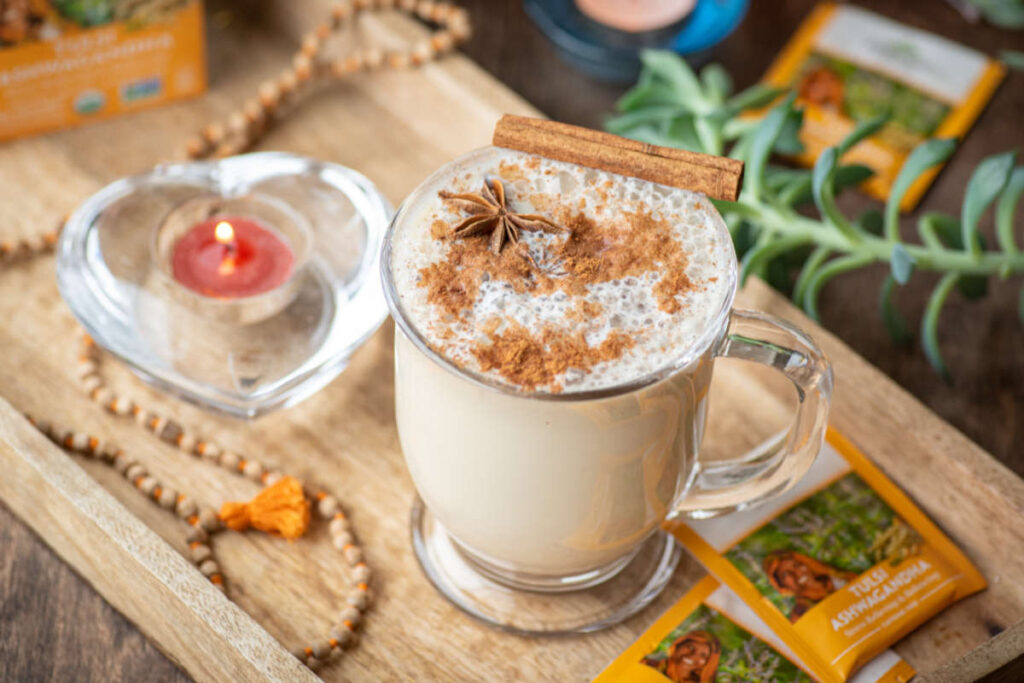
3. Holy Basil (Tulsi)
Tulsi, also known as Holy Basil or the “Queen of Herbs,” is best known for its calming and adaptogenic (stress-relieving) benefits.
However, it’s also an ideal herb for enhancing feelings of self-love and compassion while opening oneself up to loving others.
Long revered in Ayurveda as a living manifestation of the divine, Tulsi is frequently used to enhance meditation and prayer, calm the mind and body, increase self-acceptance and awareness, purify the home and whole person, and support the physical, emotional, and spiritual heart.
In India, it is considered wise to plant Tulsi in your yard as a symbol of the connection between heaven and earth, warm hospitality, and as a plant of protection, luck, and love.
Creating a Tulsi tea ritual is also a beautiful practice that nourishes your whole self, supports your heart chakra, relieves stress, and creates a more open mind and heart.
Related reading: What Makes Tulsi Sacred?
4. Chamomile
Flora Chamomile is best known for its calming and sleep-supportive properties. However, it also has a rich history of use in love potions and for supporting the heart.
Its calming properties also make it an ideal herb for promoting self-love, self-worth, inner peace, and compassion and creating the conditions for accepting and receiving love.
Chamomile is lovely to enjoy as a tea, such as Organic India’s Tulsi Honey Chamomile or Tulsi Sweet Rose. It’s also traditionally used in pouches, grown in gardens, and diffused as an essential oil.
Learn more about this humble yet powerful herb in: 7 Surprising Benefits of Chamomile Tea.
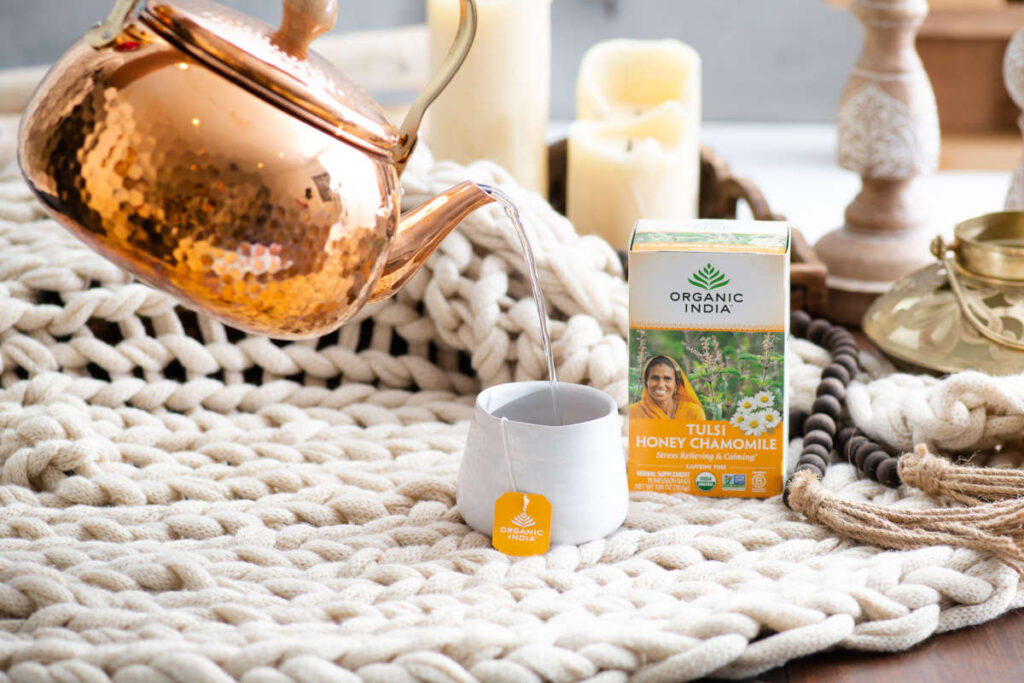
5. Ginger
Ginger’s sweet, spicy, and euphoric nature makes it a well-loved culinary spice, heart-supportive herb, and purported heat-generating aphrodisiac.
Ginger has been traditionally used internally and topically to promote feelings of warmth, support the heart and cardiovascular system, enhance energy, ease minor aches and pains, and arouse desire in men and women.*
Studies have shown Ginger is rich in antioxidants and active compounds known as Gingerols, which facilitate a healthy inflammatory response, cardiovascular function, and prompt antioxidant activity for whole body ease and detoxification.
Studies have also shown Ginger may help increase desire in men and women, but more research is needed.
Ginger is easy to find fresh, powdered, candied, or used as a tea or a supplement.
Some people also make or purchase Ginger-infused body oils for romantic massage or minor pain management.
Related reading: 7 Underrated Ginger Benefits For Women
6. Ashwagandha
Ashwagandha is to men what Shatavari is to women regarding adaptogenic herbs for love and desire.
Its name, which translates to “smell of horse”, hints at its traditional use for imparting strong energy, stamina, potency, virility, and strength.
Various studies support Ashwagandha’s traditional use as an herb for love, showing its potential benefits for reducing stress, increasing energy and stamina, promoting normal hormonal function, and supporting desire in men and women.
Ashwagandha is typically taken as a supplement and may be recommended to men or women depending on their dosha and health goals.
Organic India offers various Ashwagandha supplements, including:
- Fair Trade Certified Organic Ashwagandha Root Capsules
- NEW Organic Ashwagandha Gummies with KSM-66 Ashwagandha
- Organic Tulsi Ashwagandha Tea with Mango for an earthy-sweet flavor
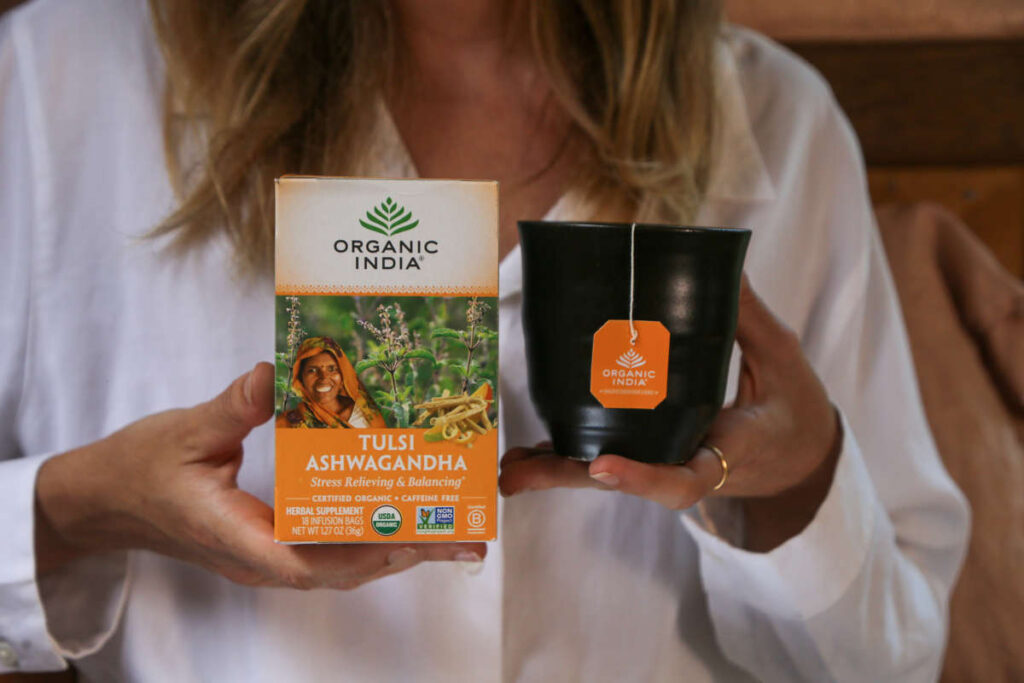
7. Shatavari
Shatavari, also known as Asparagus racemosus, is an ancient Ayurvedic herb used as a female tonic.
Its name translates to “wife of a thousand husbands who is acceptable to many”, leaving little doubt of its potential power as an herb for love, hormonal balance, and desire.
Like Tulsi and Ashwagandha, Shatavari is an adaptogen, a type of herb that helps increase stress resilience and vitality via its actions on the Hypothalamic Pituitary Adrenal (HPA) axis.
Studies have shown Shatavari contains phytoestrogens (plant estrogens), which may explain its traditional use for female reproductive function and desire, but more research is needed.
Shatavari is typically taken as a supplement, alone or combined with other complementary herbs for female wellness.
Learn more about this cherished Ayurvedic female tonic in: Benefits of Shatavari for Female Wellness.
Interested in trying Shatavari for love? Check out Organic India’s Shatavari Hormonal Balance and Essential Female, made with regenerative organic Shatavari and other traditional Ayurvedic herbs.
8. Lavender
Lavender’s beautiful purplish-blue flowers and intoxicating aroma make it a long-time favorite herb for love in various wellness systems.
Like Chamomile and Tulsi, Lavender is most well-known for its calming and soothing effects. This makes it an excellent herb for helping nourish the heart chakra, soothe the soul, and kindle greater self-love and acceptance.
Research has also shown that Lavender may support desire in older women.
Lavender is commonly used as an essential oil—diffused or in massage oils or personal care products, a soothing tea, and in recipes, such as baked goods.
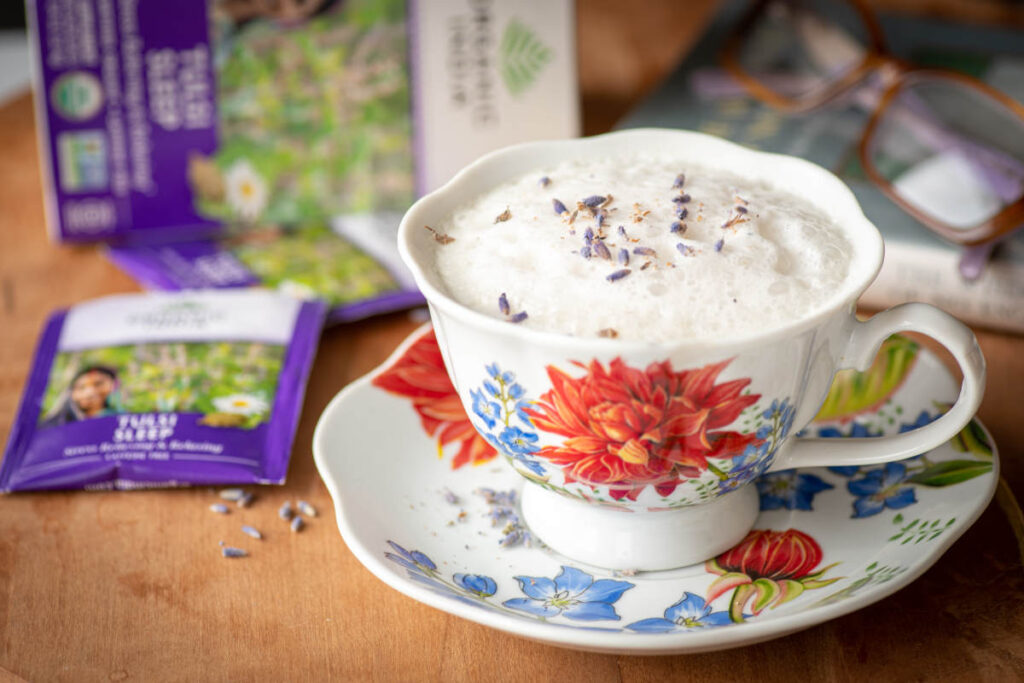
9. Rosemary
Rosemary is a popular herb for helping attract love and for bringing luck, good fortune, and protection.
It is widely used across cultures in love potions, smudges, and elixirs, weddings, churches or temples, and gardens.
Studies have shown Rosemary contains various antioxidants and active plant compounds, including Rosmaric acid, which may support focus and metabolic function and promote normal inflammatory response.
Rosemary is often used in pouches, gardens, or smudges to help clear negative energy and help attract luck and greater love and self-love.
It’s also delicious in various recipes, lovely diffused as an essential oil, and refreshing when taken as a tea.
Related Reading: Herbs For Protection

